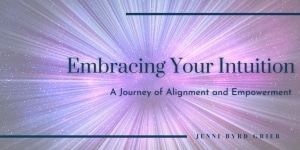Embracing Your Intuition
Intuition is often referred to as our sixth sense, an inner knowing that defies logical explanation. It’s that soft whisper, the gut feeling, or the sudden insight that nudges us in a certain direction. Yet, while it’s universally accessible, many of us struggle to recognize and trust our intuition. In a way we have given up our own power but not leaning into our own intuition. Let’s explore how to better understand, nurture, and act on this invaluable inner guide.
What is Intuition?
Defined by Webster’s Dictionary as “the power of attaining direct knowledge without evident rational thought,” intuition is often dismissed as coincidence or imagination. However, thinkers like Steve Jobs celebrated its power, claiming it to be “more powerful than intellect.” Intuition is your inner compass, guiding you toward decisions aligned with your authentic self.
Interestingly, science shows that intuition isn’t just mystical – it has roots in the body and brain. Your gut—often called our “second brain”—houses a network of neurons that process emotions and thoughts and send signals that can feel like “gut instincts.” This connection between gut health and mental clarity emphasizes the tangible side of intuition. Moreover, neuroscientists suggest that our subconscious mind, which controls 95% of our thoughts, plays a critical role in intuition. The subconscious stores experiences and emotions, forming patterns that inform intuitive decisions.
How to Strengthen Your Intuition
- Pay Attention to Your Gut Feelings
Those butterflies or knots in your stomach? That’s your body speaking to you. Start noticing these physical cues and the situations that trigger them. They are subtle but powerful indicators. - Cultivate Stillness
Intuition thrives in silence and stillness. Practices like meditation allow you to quiet the noise of daily life and tune into your inner voice. Guided meditations, in particular, can help you access this state more easily. - Slow Down and Practice Mindfulness
Mindfulness, or being fully present in the moment, enhances your ability to detect intuitive nudges. In a fast-paced world, intuition often gets drowned out by mental clutter. Take moments throughout the day to pause, breathe, and reflect. This deliberate slowing down helps you notice intuitive signals you might otherwise miss. By focusing on the here and now, you become more attuned to subtle insights.
Living an Intuitively Aligned Life
Trust is a cornerstone of intuition. Often, we dismiss intuitive feelings as irrational, unfounded, or just plain “woo woo.” Yet, the more we act on these feelings and see positive outcomes, the stronger our trust becomes. Start small—make a decision based on a hunch and observe the results. Over time, you’ll build confidence in your inner guidance system.
Living intuitively means aligning your decisions with your deeper truth. It’s about embracing nudges, signs, and inner voices as tools for personal and spiritual growth. By doing so, you create a life that resonates with your authentic self, leading to greater joy, creativity, and fulfillment.
Intuition is not a rare gift—it’s a natural ability waiting to be honed. By paying attention, cultivating stillness, and practicing mindfulness, you can unlock the power of your intuitive mind. As Albert Einstein said, “The intuitive mind is a sacred gift, and the rational mind is a faithful servant.” Let’s start honoring this sacred gift and living life guided by our inner compass. Your intuition is ready to guide you toward a life of wisdom, alignment and empowerment.
En amor y gratitud,
Jenni






